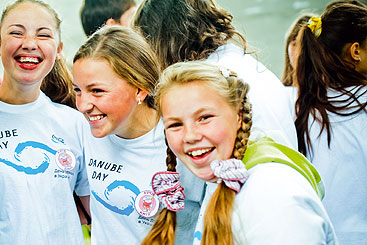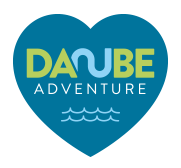Danube Day and the Green Danube Partnership: joining private with public efforts

Danube Day and
the Green Danube
Partnership:
joining private with
public efforts
Laughing children, tours with wildlife guides, open days at water research facilities: Danube Day is colourful and diverse. On 29 June each year, tens of thousands of people throughout the Danube River Basin join what has become the most successful river festival in the world, and a success story that involved private partners from the very beginning.

Joint efforts such as the Green Danube Partnership allow the international outreach activities of Danube Day to continue to grow.
Danube Day has many faces: every country celebrates it through local, often personal means. Street festivals in Belgrade, lectures in Romania, Facebook-organised flash mobs in Austria – the basin’s diversity is reflected in these manifold events. Over time, Danube Day has grown into the biggest river festival in the world. More than 230 events were held in 2011 with ten thousands of participants, and Danube Day 2012 built on this success. Essential for this growth is a fruitful cooperation between the ICPDR and the Coca-Cola Network: the Green Danube Partnership.
Formally, this partnership entails direct support from Coca-Cola Hellenic and the Coca-Cola Company for various projects on the international level. This is supplemented with further agreements between countries and Coca-Cola Hellenic on the national level. “However, the formal agreement does not really represent the full scope and dimension of the partnership,” says Philip Weller, who facilitated the development of the cooperation as Executive Secretary of the ICPDR Secretariat. “It is a relationship grown out of mutual trust with the shared objective of aligning corporate activities with the work of the ICPDR.”
In practice, the involvement of businesses allows for realisation of projects that the ICPDR would hardly pursue otherwise – such as costly outreach activities associated with Danube Day. Every year, the Green Danube Partnership funds the production of posters, giveaways and information material. Similar success is found in the Danube Box, a teaching kit on rivers and water. More than a million children have been reached through the kit since its launch in 2006, and the idea has been copied by related projects in Germany, southern Africa and the Black Sea region.
For the Business Friends of the Danube, the Green Danube Partnership is a real show case. It will therefore feature prominently in a symposium and roundtable held in Bucharest on 9 and 10 July. ‘Business, Water and Wetlands’ will be discussed in parallel with the Ramsar Convention’s Conference of the Parties. Using corporate commitment to social responsibility is an important issue in the water sector, where pressures from commercial activities are often particularly pressing. The Green Danube Partnership and Danube Day 2012 will make an excellent example of successful cooperation for the event.
Learn more about Danube Day 2012 and where events are held in your area at: www.danubeday.org
For more information on the symposium, please visit:
www.ramsar.org/cda/en/ramsar-documents
-cops-cop11/ramsar/1-31-58-500_4000_0__#10






